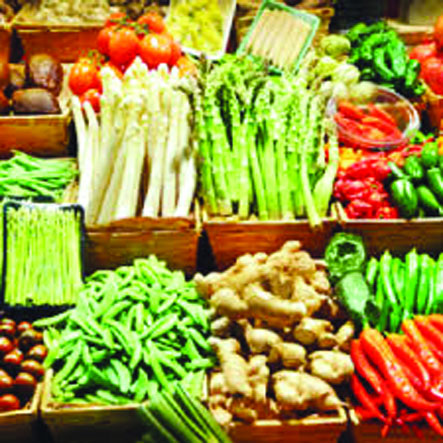The Lancet study has set markers for a planet-friendly diet but it already has a template in ayurveda
For all our environmental sensitivities and the need to reduce our carbon footprint, rarely do we look beyond the atmospherics — pollution, air quality, industrial and development monstrosities — and at ourselves, more importantly what we eat sitting atop the food chain. The latest Lancet study warns us that if we do not change our patterns of consumption and work towards a “planet friendly” diet, then we could not leave enough to support the 10 billion population that we are expected to become by 2050 as the earth can produce only so much and no further. All we need to do is shift from meat to vegetables, cut down on sugar and processed foods and eat what we can grow if we are to bequeath reserves and prevent 11 million premature deaths, the result of our current dietary habits. This would simultaneously reduce the damaging effects of climate change, soil erosion, deforestation and loss of biodiversity. In everyday life, a conscientious diet — as advocated by the report that relied on experts from around the world, including India — means halving red meat and sugar, doubling nuts, fruits, vegetables, legumes, lentils and chickpeas and apportioning 35 per cent of our calorie requirements from whole grains, tubers and plant proteins. If you are a diehard carnivore, then nutritionists estimate that you could just about provision for seven grams of red meat, 29 grams of poultry and 28 grams of fish per day. In short a nugget here and there. And if we are wondering what all this means in real terms, then one needs to internalise that food production is responsible for up to a third of global greenhouse gas emissions. A recent blog post from the World Resources Institute, a global sustainability think-tank, warns that agriculture alone could raise the Earth’s average temperature by more than 1.5 C above than in pre-industrial times if we don’t change our eating habits. This can be well understood from the fact that a simple non-vegetarian sandwich, from acquiring the land for a farm, feeding the animals whose meat you might prefer, to harvesting the wheat to processing, packaging and refrigerating the finished product and transporting it, piles up carbon debts. A recent study on the warming potential of animal-heavy diets by the University of Waterloo in Canada has even quantified how omnivores generate emissions equivalent to driving nearly 15,000 km! The World Resources Institute corroborated this with its finding that producing meat uses 20 times the land and generates 20 times the emissions as producing beans per gram of protein.
While all of these may be well-nigh alarming, for us Indians it is not too difficult a target to meet considering that our traditional diet patterns were based on the sustainable logic of ayurveda. In fact, the south Indian breakfast platter has often been rated internationally as the most wholesome start-the-day spread there is. And it certainly stays away from animal protein. Ayurveda practitioners have for long understood that the stomach of human beings, by virtue of being foragers and food gatherers at one time, is more conditioned to plant food and the latest obsession with animal protein actually does more harm than good, overloading our system. We are lucky to have an existing roadmap for a sustainable food future. Already our chefs have gotten together to revive our legume and grain heritage, something with proven nutritional benefits, and create a smart food network of the hospitality industry, advocacy groups, food producers and marketers to promote sustainable and farmer-friendly food. Gastronomic tourism is being promoted by even the Government to revive our native foods and crops, something which could help our farmers, who have lost out on their livelihood by growing market-friendly rather than geologically-appropriate vegetables and cereals. A traditional Indian diet, with its dependence on plant products and a moderation of animal protein, could well turn out to be the answer the world is looking for.


























